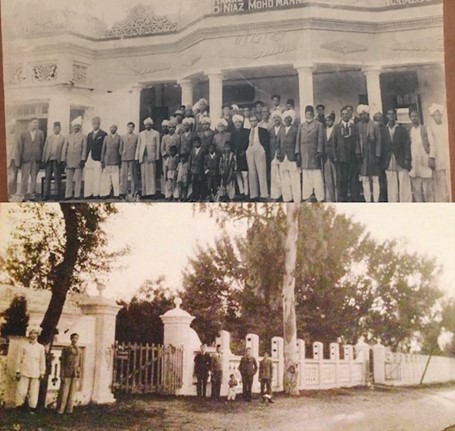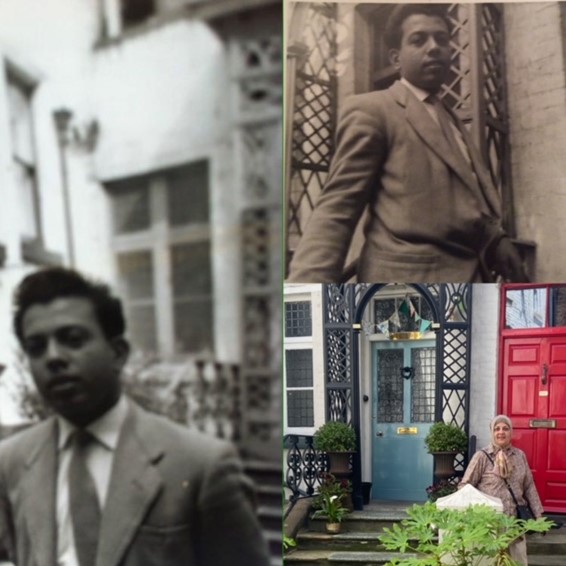Every family has a story. Hearing those stories and experiences from generations before us, their journeys, achievements, and their struggles helps us to learn and understand the roots of our history and appreciate our culture and heritage.
This year, South Asian Heritage Month marks the 75th anniversary of the 1947 partition – where British India was divided into two independent dominions, India, and Pakistan. I wanted to share my grandparents’ story of their ‘Journey of Empire’ and their experience of this time in our history.
My mother’s parents, my grandparents lived in India in the city of Hoshiarpur, and Jalandhar in Punjab. Their neighbours were Hindus and Sikhs, and they were close friends – more like extended families. In 1947 British Rule ended and the partition of India caused a lot of chaos, disruption, and confusion. My grandparents often used to tell me, “One day you are like brothers and sisters and the next day you’re told to be enemies and that bloodshed will begin imminently”. I can only imagine how scary and confusing it must have been for everyone. Families were given limited time to leave India and to make their way to Pakistan, as well as Hindus and Sikhs who lived in the newly created Pakistan to make their way back to India. Otherwise, you stayed at your own risk.
At this time of uncertainty, my grandmother was pregnant with her third child. She also had my mother who was just two years old, as well as my auntie to look after. Soon after, family members contacted her to say, “You need to leave now! Right away!”. My grandfather wasn’t at home that day. So, it was up to my grandmother to pick up what little belongings she could, and her children and embark on her journey alone to the border. She was scared and unaware of what lay ahead of her. She did not know where my grandfather was, it was a case of survival and “everyone for themselves”.
Meanwhile, my grandfather had heard loud noises nearby and said that he heard someone say, “There is a Muslim man in the building, we need to kill him.” People were rioting. My grandfather went into the back yard of a nearby house, climbed over the wall and hid. A kind Sikh family from the house hid him beneath some blankets and looked after him until he could escape to safety to the Lahore Border in Pakistan where he knew my grandmother would also be heading towards. He was relying on prayers that all would be ok. He didn’t know where they were, she didn’t know where he was.
For my grandmother, she was very vulnerable in a time where it was incredibly risky for a woman to be alone.
She found herself heading towards a walking caravan that was making its way to Lahore when she heard a gallop of horses coming her way. Men were wielding swords, angry and bloodthirsty. They wouldn’t hesitate to kill anyone in their path.
She hid, with her young children, praying they would keep quiet. Another lady was also hiding amongst the bushes she told her, “Leave the children here and look after your life,” she said, “go, go and join the caravan ahead.”
But my grandmother couldn’t do it. She held on to what she had, made her way to the caravan, and walked the remainder of the journey to the border on foot.
She arrived in Lahore – a city near the Punjab border. She entered a camp where she was to stay until someone came to reclaim her. Thankfully, my grandfather eventually arrived, and they were reunited. They applied for a house in Lahore and struggled to set up home as they, like many others, had left all their belongings and wealth behind. Today it is still our ancestral home and holds many dear childhood memories for me of my trips to visit them.
My grandfather made it his mission to return to the camps to find people who had lost their families and reunite them. People looking for husbands and wives, extended family and friends; his goal was to help support as many people as possible.
During this time, respectability and family honour were the backbone of many South Asian families. The values and morals were very similar, whether you were Hindu, Sikh, or Muslim. Some people did loot, abduct, rape and attack women. Some women had found their way back to the camps for safety, but their husbands did not want them back as they we’re seen as ‘damaged’.
During this time some families had told their wives, daughters, sisters: “If you see the enemy coming you need to not surrender to them. Do not lose the family honour! Many women jumped into deep wells and committed suicide for fear of being held captive, raped and abused.
For my dad’s father, my other grandfather, his story was different.
My dad’s father was an eye doctor. He came to England in 1929. He was also a UK Home Guard during World War II for a while. We are one of the first few families of that time. My grandfather came to a place called Dogpole in Shrewsbury in 1929 at a time when people left their homeland to make their fortune. He was very successful in Shrewsbury and travelled up and down the UK, having surgeries in Kidderminster, Birmingham, Coalbrookdale, Ironbridge, Manchester, Wrexham and Liverpool.
In 1935 he returned to India, bringing the village its first car and buying a “Kothii” (mansion house). You can see his name at the top of the photograph at the top of the article, Dr Niaz Mohd. Mann. (top pic is the front of the house and bottom pic is the back of the mango orchard)
Outside the “kothii” house are more than 200 people celebrating the day he bought this impressive home. What I love about the photograph is the diversity and the love that shines through. There are Muslims, Hindus, and Sikhs all standing together in harmony, no war, no hostility, just humanity and love.
My two uncles and my grandfather are in the photograph wearing flower garlands to represent the welcoming of a new home. My dad was not born until 1939.
The gardens had mango orchards as well as a small Hindu temple and a home for the gardener. My dad often speaks about how he and his brothers used to climb the trees after school to pick a mango before the groundsmen caught them.
My dad’s parents also fled India during the Partition with the caravan successfully and came over to Pakistan, leaving their Kothii house behind. They came to Lahore first and then moved to another city in Pakistan called Faisalabad.
When I speak to my friends, or some of our Punjabi patients, about heritage and show them the photograph of my grandfather’s home some say the house is still there, it has been turned into a college. For me, I would really like to go and see it and visit some of the places that my family have originated from, retracing some of the steps to connect to the stories that I have been told. I would also like to visit the grave of my great grandmother. My maiden name holds much interest to many as it’s not a typical Muslim surname, but im lucky enough to know the origins and the history behind it.
My dad came to England in Shrewsbury when he was eight years old. He studied at Shrewsbury Technical College there and became an engineer – he even did work on Shrewsbury’s “Ironbridge”. He used to bump into Billy Wright occasionally and their family. Eventually my parents uprooted from Shrewsbury in the 60s and moved to Liverpool, that’s where I was born, and the rest of my sisters. I’ve taken a 360 degree turn and come back and settled in the West Midlands for work, adopting family life. I often go to Shrewsbury and see my grandfather’s grade 2 listed home and think about how they lived here. The places they walked and the stories they share with us. I facetime my dad who is 83 now and let him give me a tour of the area! Ironically my daughter-in-laws are opticians and work a stone’s throw away from the house.
You can see from the images at the top of the article my dad Taj Mann and myself recreating the scene for dad.
I’ve worked for the NHS for around 21 years. I come across many colleagues from different backgrounds who all have their story to tell. I hope my grandparents’ story shines a light on what it was like during this time in our history.
These stories need to be shared with future generations to remember and reflect so they can honour those who were lost during this time. Thank you for reading mine.


